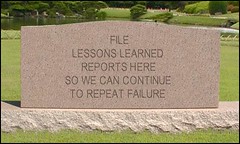 Image by Mike Licht, NotionsCapital.com via Flickr
Image by Mike Licht, NotionsCapital.com via Flickr
I have put together a compilation of lessons learned resources with some relevance to the State Department and the Foreign Service here. The web page is live in googlepages and will be updated as needed; a new link is added from Diplopundit's Online Resources for easy access (see right side-bar). Any suggestion for additional materials would be deeply appreciated.
I also found this Mike Licht image of a lessons learned tombstone. He writes in his blog that "A “Lessons Learned” report is a ceremonial corporate mea culpa that will be swiftly embalmed, buried, entombed in archives, and unread by the next set of leaders, who will embark on similar misguided projects of their own." I hope that is not the case here.
Hard Lessons: The Iraq Reconstruction Experience | Released by SIGIR in January 2009
Hard Lessons concludes with 13 lessons drawn from 6 difficult years of Iraq reconstruction. Virtually all the leadership interviewed for this report agreed that the US approach to contingency relief and reconstruction operation needs reform.
Oral Histories: Iraq Provincial Reconstruction Teams | 2008-2009
The Iraq PRT program has highlighted the challenges that the U.S. government faces in conducting operations in conflicted environments. The Iraq PRT Project collected insights and lessons learned from government, military, and non-governmental officials. Interviews were conducted by the Association for Diplomatic Studies and Training under a contract with the Institute of Peace.
Includes interviews with 72 Government Officials from 2008-2009. There are also several interviews of military officers and NGO personnel.
Provincial Reconstruction Teams in Iraq | Special Report, March 2007
This report examines the U.S. experience with PRTs in Iraq, notes shortcomings, and suggests ways they could be more effective. The report is based on statements by panelists at a public forum held at the Institute on February 14, 2007, and on interviews conducted by the author with government agencies and commercial contract firms that participate in the PRT program. Report is by Robert M. Perito, senior program officer at the United States Institute of Peace.
Oral Histories: The Sudan Experience Project | 2006-2007
Sudan's North-South Comprehensive Peace Agreement (CPA) is a unique example of an effort by the international community to negotiate and to implement a peace agreement. The Sudan Experience Project Oral History Library contains the transcripts of nearly 100 interviews with those who negotiated and who are implementing the CPA. These first person accounts and the lessons learned from their experience are a substantial contribution to our understanding of the challenges of negotiating and implementing complex peace agreements.
Includes interviews with 33 Negotiators and 57 Implementers taken from 2006-2007.
Oral Histories: Afghanistan Provincial Reconstruction Teams | 2005 In November 2005, there were 22 PRTs in Afghanistan: nine were directed by the U.S. and countries belonging to the NATO-led International Security Assistance Force directed the other 13. The Afghanistan Experience Project collected lessons learned by Provincial Reconstruction Teams by interviewing 52 government officials, military officers, and representatives of international and non-governmental organizations who had served in Afghanistan. Interviews were conducted by the Association for Diplomatic Studies and Training under a contract with the Institute of Peace.
Includes interviews with 52 Government Officials in 2004-2005. There are also several interviews of military officers (12) and IO/NGO personnel (4).
The U.S. Experience with Provincial Reconstruction Teams in Afghanistan: Lessons Identified
| Special Report, October 2005
This report is the product of the United States Institute of Peace's Afghanistan Experience Project. It is based on extensive interviews conducted with American and foreign officials, soldiers, and representatives of nongovernmental organizations that worked directly with Provincial Reconstruction Teams in Afghanistan. It also reflects interviews conducted with a broad range of contacts during the author's visit to Afghanistan in June 2005. The report discusses lessons identified by those who served in Afghanistan. It is intended as a training aid for developing programs that prepare American personnel for service in peace and stability operations. Robert M. Perito, Coordinator of the Afghanistan Experience Project at the U.S. Institute of Peace, prepared this report.
The 9/11 Commission Report | Public report released on July 22, 2004
The National Commission on Terrorist Attacks Upon the United States (also known as the 9-11 Commission), an independent, bipartisan commission created by congressional legislation and the signature of President George W. Bush in late 2002, is chartered to prepare a full and complete account of the circumstances surrounding the September 11, 2001 terrorist attacks, including preparedness for and the immediate response to the attacks. The Commission is also mandated to provide recommendations designed to guard against future attacks.



No comments:
Post a Comment